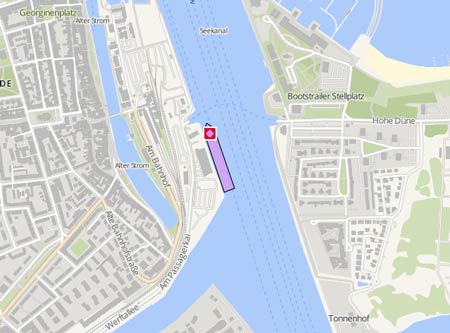DOLFIJNGRACHT
Kurs/Position
Die letzten Häfen
Die letzten Wegpunkte
Die neuesten Nachrichten
AMSA assisted injured sailor for five days
Over the course of the past five days, the Australian Maritime Safety Authority arranged a medical intervention for an injured crew member of the 'Dolfijngracht' in the Indian Ocean. In the evening of Nov 14, 2020, she called for assistance about 1,000 nauical miles off the coast of Western Australia enroute from Durban. A crew member had sustained serious burns in an accident on board, and he needed medical assistance. The AMSA's emergency response center in Canberra coordinated a response with other defense and civilian agencies to provide aid and keep the victim stable until the vessel could make port. The AMSA dispatched a Challenger patrol aircraft out of Perth to air-drop medical supplies to the ship, and it set up a telemedicine assistance connection to assess the crew member's condition. The AMSA requested assistance from the Australian Defence Force which tasked the Royal Australian Navy with a planned ship-to-ship medical evacuation. On Nov 17, a Royal Australian Navy medical team consisting of two doctors, one nurse and three additional personnel boarded the submarine intervention ship Besant, a special-purpose vessel operated by a private contractor on behalf of the RAN. They rendezvoused with the 'Dolfijngracht' later that day, transferred on board and provided medical assistance to the seafarer while the freighter headed for port. On Nov 18, the 'Dolfijngracht' arrived in Fremantle, and the victim was delivered to shore for transfer to a hospital. The ship has since departed, bound for the port of Portland with an ETA as of Nov 23. Report with video: https://maritime-executive.com/article/video-australian-sar-plane-airdrops-emergency-supplies-to-freighter
Freighter rescued ocean rower
The US Coast Guard coordinated the rescue of Niall Macdonald aboard ocean rowboat "Alba" on June 15, 2018, after he activated his emergency position indicating radio beacon about 530 miles off the coast of Cape Cod. Niall Macdonald triggered his EPIRB around 12:30 a.m. alerting Coast Guard watchstanders to his distress. Due to sporadic connectivity, Macdonald was able to call watchstanders at the United Kingdom Mission Control Center via satellite phone. He reported facing 36 hours of rough seas causing his rowboat to take on water. He abandoned the ocean rower for his life raft. Watchstanders from the First Coast Guard District in Boston coordinated with the United Kingdom Mission Control Center to relay satellite phone messages. Coast Guard watchstanders sent out an urgent marine bulletin to vessels in the area requesting assistance and coordinated with the Rescue Coordination Center in Halifax, Canada, to launch a Canadian C-130 aircraft to assist in the rescue due to the distance offshore. Coast Guard watchstanders also coordinated with Maritime Rescue Coordination Center Rome to divert the nearby Italian Naval warship, "Alpino", to assist in rescuing Macdonald, but the ship was 80 miles away. Responding to the urgent marine broadcast, the "Dolfijngracht" arrived on scene with the "Alba" at 5 a.m. and found Macdonald in a life raft, tired, but in good condition. The search and rescue cooperation between the United States, United Kingdom, Canada, Italy, and the Netherlands resulted in saving the mariner’s life. Macdonald was taken on to the next port call Escoumins in Canada. He had an EPIRB, a personal locator beacon, satellite phone, VHF radio, navigation lights, flares, immersion suit, life jacket, and a transportable kit with other items to help him survive in an emergency. At the time of the rescue, the weather conditions were 10-foot seas and 26 knot winds.
News schreiben

